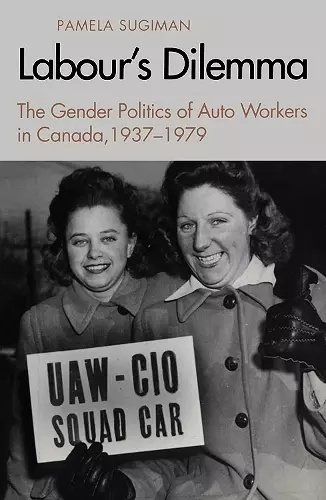Labour's Dilemma
The Gender Politics of Auto Workers in Canada, 1937-79
Format:Paperback
Publisher:University of Toronto Press
Published:8th Nov '94
Currently unavailable, and unfortunately no date known when it will be back

The growth of the United Auto Workers in Canada dramatically improved the lives of thousands of workers. Not only did it achieve impressive bargaining gains, but the UAW was regarded as one of the most democratic and socially progressive of the major industrial unions in North America. However, workers in the automotive sector, who constituted the largest segment of the UAW membership, witnessed blatant gender inequalities. From 1937 to 1979, UAW leaders did little to challenge these inequalities. Both the union and the workplace remained highly masculine settings in which male workers and bosses played out the gender politics of the times.
Pamela Sugiman draws on archival materials and in-depth interviews with workers and union representatives to explore the ways in which the small groups of women in southern Ontario auto plants fought for dignity, respect, and rights within this restrictive context. During the Second World War, women auto workers formed close bonds with one another - bonds that rested largely around their identification as a sex. By the late 1960s, they were drawing on a growing union consciousness, the modern women's movement, and their gender identity, to launch an organized collective struggle for sexual equality.
In describing the women's experiences, Sugiman employs the concept of a `gendered strategy.' A gendered strategy incorporates both reasoned decisions and emotional responses, calculated interests and compromises. Within a context of gender and class divisions, workers developed strategies of coping, resistance, and control. Labour's Dilemma reveals how people may be simultaneously agents and victims, compliant and resistant.
'Pamela Sugiman offers a fresh and compelling look at how questions of gender helped to shape the work lives of women auto workers in Canada.'
* Contemporary Sociology *'Richly detailed and argued, Labour's Dilemma is an important book.'
-- Nancy Gabin * American Journal of Sociology *'This is a thoughtful and carefully researched study that begins to fill one of the glaring omissions in Canadian labour history. At the same time, it provides an intriguing new dimension to the very topical and important project of reconstructing women's labour history.'
-- Julie Guard * Labour *'This book's outstanding contribution is historical rather than theoretical. Sugiman adds a Canadian dimension to the literature on the history of women in the United Auto Workers.'
-- Desma Holcomb * Industrial and Labor Relations Review *'This book is strongly recommended reading for students of labour relations, people working in the area of labour relations and for those who want to understand the process of change in society and its impact in the workplace and unions.'
-- Cathy Murphy * Canadian Review of Social Policy *'Sociologist Pamela Sugiman has written a rich and densely-detailed account of the transformation of gender politics among Southern Ontario auto workers from the 1930s to the end of the 1970s. The book is rewarding on many levels...'
-- Dorothy Sue Cobble * Industrial Relations Journal *"Pamela Sugiman's Labour's Dilemma: The Gender Politics of Auto Workers in Canada, 1937-1979, a jewel among labor histories, sets out a complex and intriguing relationship between unionism and feminism that does justice to both social movements without casting participants as perfect ideologues...Sugiman's book is an antidote to the minimalism of most labor economics and might well be used to introduce economics into women's history studies.'
-- Esther Redmount, Colorado College * n Business Library ReviISBN: 9780802074034
Dimensions: 228mm x 152mm x 23mm
Weight: 480g
294 pages